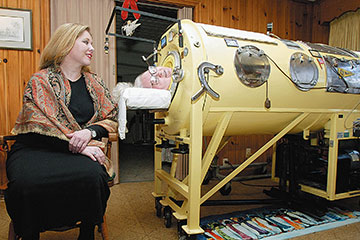
Mary Dalton visits Martha Mason, subject of “Martha in Lattimore.” (Wake Forest Magazine/ Jeff Melton)
Two Wake Forest University professors will hold a preview screening of a documentary film about a Wake Forest graduate who has spent most of her life in an iron lung.
Titled “Martha in Lattimore,” the film will be shown at 7 p.m. on April 19 at Wake Forest in the Benson University Center’s Pugh Auditorium. The event, free and open to the public, is sponsored by Wake Forest’s department of communication with support from the Pro Humanitate Center, a project of the Lilly Endowment.
Mary Dalton, assistant professor of communication, and Michelle Gillespie, Kahle Associate Professor of History, worked together on the film. It tells the story of Wake Forest graduate, Martha Mason, who has lived with the assistance of an iron lung for 57 years – longer than anyone else in the world.
“Martha says that she has survived for so many years, while so many others with the same disease died, because of the exceptional care she received from her parents and community, and because she has always been driven to learn,” says Gillespie, the film’s executive producer.
Mason’s drive to learn is exemplified by her education at Wake Forest, where she graduated first in the class of 1960. Ed Wilson, one of Mason’s professors at Wake Forest, called Mason “the most extraordinary person I have ever taught.” Wilson, professor emeritus of English and provost emeritus, will provide introductory remarks at the screening.
Dalton, who directed the film, says it involves elements of Mason’s published memoir, “Breath: Life in the Rhythm of an Iron Lung,” but concentrates on Mason’s day-to-day experiences in her hometown of Lattimore, a small town in Cleveland County. “We have tried to show, at least to some degree, what a remarkable person Martha is by telling her story in the context of her daily life,” Dalton says.
Following the screening, Dalton and Gillespie will answer questions and invite observations and suggestions from the audience. Dalton and Gillespie hope to use the audience input to further develop the film into its final version, which they will submit to various film festivals.
Categories: Arts & Culture, Events, Faculty, Research
Headlines
Wake Forest in the News
Wake Forest regularly appears in media outlets around the world.




